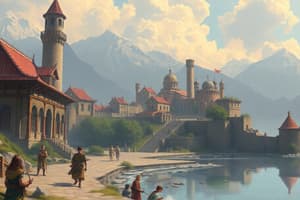Podcast
Questions and Answers
During which historical period did the Egyptians, Greeks, Romans, and Persians emerge and flourish?
During which historical period did the Egyptians, Greeks, Romans, and Persians emerge and flourish?
- Modern history
- Medieval period
- Ancient history (correct)
- Prehistoric times
Which system of mutual obligations between lords and vassals characterized the medieval period?
Which system of mutual obligations between lords and vassals characterized the medieval period?
- Feudalism (correct)
- Capitalism
- Communism
- Socialism
Which empire was known for its significant influence during the modern period?
Which empire was known for its significant influence during the modern period?
- Roman Empire
- Greek Empire
- Ottoman Empire (correct)
- Persian Empire
In which historical period did the Renaissance take place?
In which historical period did the Renaissance take place?
Which civilizations made significant contributions to art, literature, philosophy, science, politics, and law in ancient times?
Which civilizations made significant contributions to art, literature, philosophy, science, politics, and law in ancient times?
Which civilizations are associated with the medieval period?
Which civilizations are associated with the medieval period?
What is the main focus of global history?
What is the main focus of global history?
Which branch of history deals with the study of historical methods and the role of historians in society?
Which branch of history deals with the study of historical methods and the role of historians in society?
What do historical methods such as archaeology and genealogy provide for historical research?
What do historical methods such as archaeology and genealogy provide for historical research?
What is historical interpretation primarily concerned with?
What is historical interpretation primarily concerned with?
How do historians contribute to society according to the text?
How do historians contribute to society according to the text?
What is the overall impact of studying history, according to the text?
What is the overall impact of studying history, according to the text?
Flashcards are hidden until you start studying
Study Notes
General Knowledge - History
History is a discipline of academic study dealing with the past. It encompasses all aspects of human existence from prehistoric times through recent events. As a subject taught in schools, it covers world history including European, Asian, African, Middle Eastern, American, Australian Aboriginal histories and histories of other civilizations.
Ancient History
Ancient history deals with the period before the medieval period starting around 500 AD. During this time, various civilizations emerged and flourished across the globe, such as the Egyptians, Greeks, Romans, and Persians. These early societies developed their own distinct cultures and made significant contributions to art, literature, philosophy, science, politics, and law.
Medieval History
The medieval period extends from approximately 500 AD to 1500 AD. This era saw the development of powerful kingdoms in Europe, Asia, and Africa, known as feudalism. The feudal system was based on mutual obligations between lords and their vassals, with the vassals providing military service to the lords in exchange for land.
Modern History
The modern period covers the time from the Renaissance in the 14th century to the present day. This era saw the rise of powerful empires, including the Ottoman Empire, the Spanish Empire, and the British Empire, which had far-reaching impacts on the world.
Global History
Global history is a relatively new approach to history that focuses on understanding the interconnectedness of the world's past. It seeks to move away from the Eurocentric view of history and provide a more holistic understanding of human history.
Historiography
Historiography is the branch of history that deals with the writing of history and the historians who produce it. It includes the study of historical methods, the interpretation of history, and the role of historians in society.
Historical Methods
Historical methods include archaeology, historical linguistics, papyrology, genealogy, and other disciplines that provide evidence for historical research. These methods help historians piece together the past and create a narrative that is as accurate as possible.
Historical Interpretation
Historical interpretation involves the process of understanding and explaining historical events. It involves analyzing primary sources, secondary sources, and other historical evidence to develop a narrative that explains what happened and why.
Role of Historians in Society
Historians play a crucial role in society by helping us understand our past and the reasons behind the events that have shaped our world. They provide valuable insights that can inform our decisions and help us navigate the complexities of the modern world.
In conclusion, history is a rich and diverse discipline that provides valuable insights into the human experience. From the earliest civilizations to the present day, history helps us understand the world we live in and the forces that have shaped it. By studying history, we can gain a deeper appreciation for the complexities of human existence and the interconnectedness of our world.
Studying That Suits You
Use AI to generate personalized quizzes and flashcards to suit your learning preferences.




